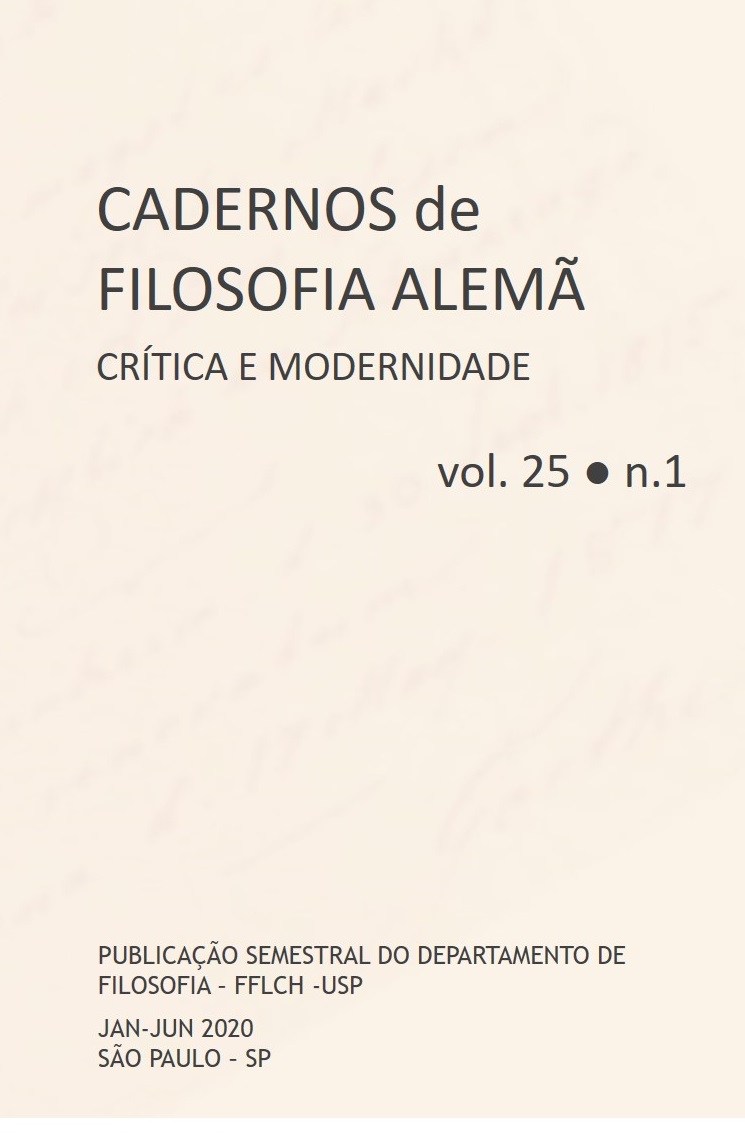Genealogia e crítica
duas formas de questionamento ético da moral
DOI:
https://doi.org/10.11606/issn.2318-9800.v25i1p191-212Keywords:
Adorno, crítica, ética individual, genealogia, Nietzsche, questionamento crítico da moralAbstract
Translation of "Genealogie und Kritik: zwei Formen ethischer Moralbefragung", from Christoph Menke
Downloads
References
Adorno, T., & Horkheimer, M. (1988). Dialektik der Aufklärung. Frankfurt am Main: Fischer Verlag, 1988.
Adorno, T., & Horkheimer, M. (1985). Dialética do Esclarecimento: fragmentos filosóficos. Tradução de Guido Antonio de Almeida. Rio de Janeiro: Zahar.
Adorno, T. (1992). Minima Moralia: reflexões a partir da vida danificada. Tradução de Luiz Eduardo Bicca. São Paulo: Editora Ática.
Adorno, T. (2009). Dialética Negativa. Rio de Janeiro: Zahar.
Butler, J. (1997). The Psychic Life of Power: theories in subjection. Stanford: Stanford University Press.
Cavell, S. (1990). “Aversive Thinking: Emersonian Representations in Heidegger and Nietzsche”. In: Conditions Handsome and Unhandsome. Chicago: Chicago University Press.
Conway, D. W. (1997). Nietzsche & the Political. London/New York: Routledge.
Düttmann, A. G. (1996). Was Liebe heißt in allen Sprachen und Stummheiten dieser Welt: Nietzsche, Genealogie, Kontingenz. Grafrath: Boer.
Fink-Eitel, H. (1993). Nietzsches Moralistik. In: Deutsche Zeitschrift für Philosophie, Bd. 41, 865-880.
Foucault, Michel. (1978). „Nietzsche, die Genealogie, die Historie“. In: Von der Subversion des Wissens. Frankfurt a.M./Berlin/Wien: Ullstein.
Günther, K. (1985). „Dialektik der Aufklärung in der Idee der Freiheit. Zur Kritik des Freiheitsbegriffs bei Adorno“. In: Zeitschrift für Philosophische Forschung, 39, pp.229-260.
Honneth, A. (1997). „Anerkennung und moralische Verpflichtung“. In: Zeitschrift für philosophische Forschung. Bd. 51, 25-44.
Joas, H. (1997). Die Entstehung der Werte. Frankfurt a.M: Suhrkamp.
Luhmann, N. (1990). Paradigm Lost: Über die etische Reflexion der Moral. Frankfurt: Suhrkamp.
Nancy, J.-L. (1986). „Unsere Redlichkeit!' (Über Wahrheit im moralischen Sinn bei Nietzsche)“, In: Hamacher, W. (org.). Nietzsche aus Frankreich. Frankfurt a.M./Berlin/Wien: Ullstein.
Nietzsche, F. (2001). A Gaia Ciência. Tradução de Paulo César de Souza. São Paulo: Companhia das Letras.
Nietzsche, F. (1887). Die fröhliche Wissenschaft. Leipzig: Verlag.
Nietzsche, F. (1892). Zur Genealogie der Moral: eine Streitschrift. Leipzig: Verlag.
Nietzsche, F. (1988). Nachlaß, Winter 1870-1 – Autumn 1872, 8 [115]. In: Sämtliche Werke, vol. 7. Berlin and Munich: de Gruyter/dtv.
Nietzsche, F. (1992). Além do bem e do mal. Tradução de Paulo César de Souza. São Paulo: Companhia das Letras.
Nietzsche, F. (1998). Genealogia da moral: uma polêmica. Tradução de Paulo César de Souza. São Paulo: Companhia das Letras.
Nietzsche, F. (2005). Humano Demasiado Humano. Trad. de Paulo César de Souza. São Paulo: Companhia das Letras.
Nietzsche, F. (2016). Aurora: reflexões sobre os preconceitos morais. Tradução de Paulo César de Souza. São Paulo: Companhia de Bolso.
Schiller, F. (1873). Über die ästhetische Erziehung, in Reihe von Briefen. In: Schillers sämtliche Werke in 12 Bänden, vol. 12. Stuttgart: J.G. Cotta'sche Buchhandlung.
Schweppenhausen, G. (1993). Ethik nach Auschwitz. Adornos negative Moralphilosophie. Wiesbaden: Springer VS.
Williams, B. (1995). “Nietzsche's Minimalist Moral Psychology”. In: Making Sense of Humanity. New York: Cambridge University Press.
Yovel, Y. (1989). Spinoza and Other Heretics: The adventures of Immanence. Bd. 2. Princeton: Princeton University Press.
Downloads
Published
Issue
Section
License
Information and conceptions on the texts are complete responsibility of the authors.
All the articles submitted before July 5th 2018 and those published after July 2021 are licensed under a CC BY-NC-ND license – except those published between the aforementioned dates, which are under the CC BY-NC-SA license. The permission for the translation of the material published under the license CC BY-NC-ND by third parts can be obtained with the consent of the author.
Open access policies - Diadorim
Rules applied before July 5th 2018:
Presenting a submission to our Editorial Board implies granting priority of publication for “Cadernos de filosofia alemã”, as well as transferring the copyright of texts (once published), which will be reproduced only with the manifest authorization of the editors. Authors keep the right to reuse the texts published in future editions of their work, without paying any fees to "Cadernos”. We will not grant the permission to re-edit or translate the texts for third parts without agreement of the author.


